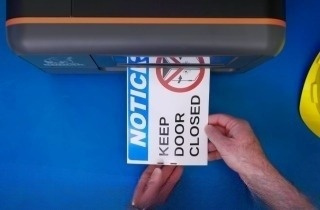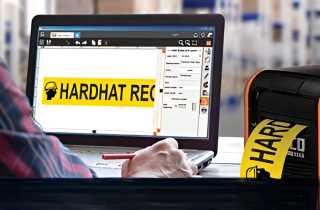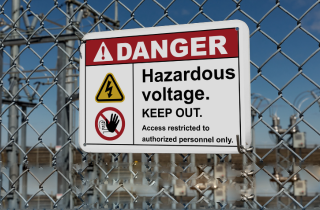Choosing the Right Industrial Label Printer for Your Business Needs

In the world of industrial labeling solutions, one size certainly does not fit all. Different businesses and industries have unique label printing requirements based on their specific operations, products, and regulatory standards. Selecting the right industrial label printer for a facility can impact safety, efficiency, and compliance. To make an informed choice for visual communication, consider the following factors:
- Labeling Requirements: Determine the types of vinyl labels your facility needs. Are they for safety, equipment identification, inventory management, or compliance? Different labels printers are designed for various label types.
- Printing Volume: Assess the volume of durable labels your facility requires on a daily, weekly, or monthly basis. High-volume facilities may require label printers with faster printing speeds and larger supply capacities.
- Label Size and Format: Consider the range of label sizes you need. Some facilities require small barcode labels, while others need large signs. Choose an industrial label printer that can accommodate your desired label size and format.
- Printing Speed and Efficiency: Evaluate the printing speed of the printer. Facilities with high printing demands should opt for an industrial label printer with faster throughput to avoid bottlenecks.
- Durability Requirements: Assess the environment where the labels will be used. Some vinyl labels may need to withstand harsh conditions, such as extreme temperatures, chemicals, or UV exposure. Choose a printer that can produce durable labels suited to your facility's conditions.
- Compliance and Regulations: Ensure that the printer can produce labels that comply with industry-specific regulations and standards. This is critical in industries like healthcare, manufacturing, and chemical processing.
- Color Printing: Determine if color-coding is necessary for your vinyl labels. Some facilities use color-coded labels for safety or organizational purposes. If color is essential, choose an industrial color label printer to improve your facility's visual communication.
- Connectivity and Integration: Consider whether the printer can integrate with your facility's network for centralized label management and printing. This can streamline operations and reduce errors.
- Ease of Use: Evaluate the user interface and ease of operation. An intuitive interface can reduce training time and minimize errors during label design and printing.
- Portability: If your facility requires on-site labeling in various locations, consider portable label printers with battery options. This is essential for industries like construction or field services.
- Supplies and Consumables: Ensure that the printer supports a wide range of label materials, including those suitable for your specific applications.
- Software and Label Design: Check if the printer comes with or supports label design software. Consider whether it offers customization options or templates for creating safety labels.
- Service and Support: Review the warranty and maintenance options available for the label printer. Reliable customer support is essential for addressing issues promptly.
- 14. Future Scalability: Think about your facility's growth potential. Choose a printer that can accommodate your future label printing needs without requiring frequent upgrades.
By thoroughly evaluating these factors in the context of your facility's unique requirements, you can choose the industrial label printer that best aligns with your operational goals, compliance needs, and efficiency objectives.
Using an Industrial Label Printer for Business-Specific Labeling Needs
Depending on needs, DuraLabel offers excellent options of industrial label printer machines for maintaining safety standards, complying with regulations, and streamlining operations in the Toro Max and Kodiak Max. These all-in-one industrial labeling solutions offer distinct features that cater to various business needs. Here are the main advantages and key attributes of both label printers to help you make an informed decision for your organization.
Toro Max for Versatile Industries: 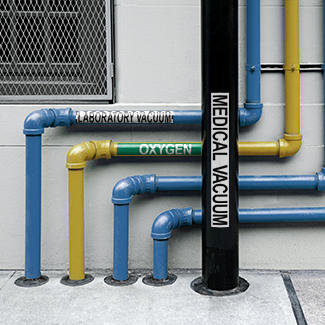
- Manufacturing: Manufacturers often require a broad range of vinyl labels, from product identification to safety signage. The Toro Max's flexibility in label design and its compatibility with various supplies make it a solid choice for manufacturing businesses.
- Warehousing and Logistics: In the world of warehousing and logistics, clear and accurate labeling is essential for inventory management. Toro Max's portable capabilities are advantageous for on-the-spot labeling in warehouses.
- Healthcare: In the healthcare industry, durable labels must meet stringent regulations and standards for patient safety and record-keeping. The Toro Max's customizable label design and durable supplies cater to these specific needs.
- Construction: Construction sites often need on-site industrial labeling solutions for safety warnings, equipment identification, and more. Toro Max's portability is a significant advantage for construction businesses operating in dynamic environments.
- Electrical and Electronics: Labeling in this industry often involves precise identification of components and adherence to safety codes. The ability to print durable labels quickly makes Toro Max a valuable asset.
Kodiak Max for Large-Scale and Specialized Applications:
- Chemical and Hazardous Materials: Businesses dealing with chemicals and hazardous materials require safety labels that comply with GHS/HazCom 2012 regulations. Kodiak Max's large-format and multi-color printing capabilities are well-suited for creating detailed and compliant chemical resistant labels.
- Manufacturing (Large Products): Industries producing oversized products or machinery benefit from Kodiak Max's ability to print large-format vinyl labels and signs. These durable labels can include detailed diagrams, safety instructions, and product information.
- Energy and Utilities: Energy facilities and utility companies often need labels for electrical equipment, pipelines, and substations. Kodiak Max's large supply width and versatile industrial labeling solutions cater to these specialized needs.
- Aerospace and Defense: Precision and durability are paramount in aerospace and defense. Kodiak Max's two-color printing and the ability to handle long label lengths are advantageous for creating detailed vinyl labels and markings on aircraft components and defense equipment.
- Facility Management: Large facilities and campuses require wayfinding signage and facility management labels. Kodiak Max's large format is ideal for creating clear and visible signs.
DuraLabel Industrial Label Printer Solutions
When choosing the right industrial label printer for your business, consider your specific needs and requirements. The Toro Max is a versatile mid-size all-in-one solution, perfect for a wide range of industries. It's portable, easy to use, and offers durable labels.
On the other hand, Kodiak Max excels in large-format, multi-color printing, making it suitable for businesses that require high-quality, oversized safety labels and signs. Its two-color printing and efficient ribbon cartridges enhance your printing capabilities.
Ultimately, the choice between Toro Max and Kodiak Max will depend on the scale of your labeling needs and the specific features that align with your facility requirements. Whichever you choose, both label printers are equipped with LabelForge PRO software, backed by 5-year warranties, and come with lifetime free customer support, ensuring you have the tools you need to create standardized labels and signs that meet regulatory standards and enhance visual communication in your workplace.
Related Resources
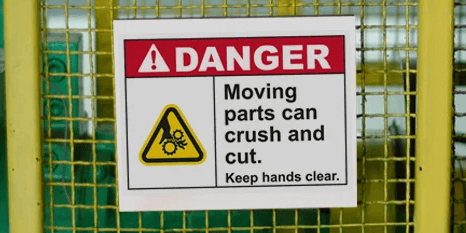
Safety Signs Best Practices for Safer, More Compliant Workplaces
How Does Proper Safety Signage Improve Compliance and Reduce Workplace Risks? Proper safety signs play a ...
Read
Industrial Safety Labels | Label Signage | Sign Label
The accurate interpretation of safety signs is crucial to prevent injuries and save lives. OSHA has set ...
Read
Why OSHA Lab Safety Depends on Proper Chemical Labeling Practices
Why Do Pharmaceutical Labs Need Proper OSHA Chemical Labeling? In the realm of pharmaceutical research and ...
Read.png)

